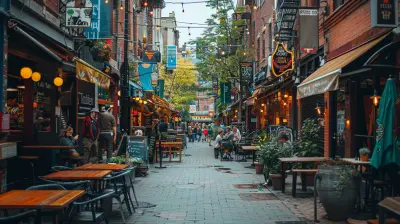How to Travel Long-Term Without Going Broke
12 July 2025
Traveling long-term seems like a dream, right? Imagine waking up in a new city every few weeks, tasting exotic foods, meeting incredible people, and soaking in different cultures. But then reality hits—how do you afford it without draining your bank account?
The good news? You don’t need to be rich to travel indefinitely. With the right mindset and smart financial strategies, you can make it happen. Let’s break down exactly how to travel long-term without going broke. 
1. Rethink Your Travel Mindset
First things first—forget the idea that travel is expensive. Sure, vacations can be pricey, but long-term travel is different. Instead of spending big on five-star hotels, fancy restaurants, and tourist traps, you adopt a budget-friendly, sustainable lifestyle.Think more like a digital nomad or a backpacker than a tourist. Instead of splurging on luxury, you focus on long-term affordability. 
2. Plan Your Budget (And Stick to It)
Track Your Expenses
Before you even pack your bags, take a hard look at your finances. Create a realistic travel budget based on how much you can afford to spend each month.Apps like Trail Wallet or Mint can help you track every dollar you spend on the road. The goal? Spend less than you earn so you can keep traveling without going broke.
Estimate Your Monthly Costs
Here’s a rough breakdown of potential expenses for long-term travelers:- Accommodation: $200–$1,000/month (hostels, Airbnb, co-living spaces, house sitting)
- Food: $150–$500/month (local markets, street food, cooking at home)
- Transportation: $50–$300/month (budget flights, buses, trains, rented bikes)
- Activities: $50–$200/month (tours, entrance fees, experiences)
- Miscellaneous: $100–$300/month (SIM cards, laundry, gear replacement)
The final amount depends on where you travel. Southeast Asia and Latin America? Super affordable. Western Europe or Japan? You’ll need a bigger budget. 
3. Choose Affordable Destinations
Not all destinations are created equal—some places drain your bank account, while others stretch your dollars far. If you’re serious about long-term travel, opt for budget-friendly locations.Top Cheap Travel Destinations
- Southeast Asia: Thailand, Vietnam, Cambodia, Indonesia- Latin America: Mexico, Colombia, Ecuador, Guatemala
- Eastern Europe: Poland, Romania, Bulgaria, Georgia
- South Asia: India, Nepal, Sri Lanka
These places offer cheap accommodations, affordable food, and low-cost transportation—perfect for long-term travelers on a budget. 
4. Find Free or Cheap Accommodation
Accommodation is one of the biggest expenses, but there are ways to stay for free (or almost free).Ways to Save:
- House Sitting: Stay in someone’s home for free while they travel. Websites like TrustedHousesitters connect travelers with homeowners looking for caretakers.- Hostel Work Exchanges: Many hostels offer free stays in exchange for a few hours of work per day. Check out Workaway, Worldpackers, or HelpX.
- Couchsurfing: Stay with locals for free and experience authentic cultural exchanges.
- Long-Term Rentals: Instead of staying in hotels, rent an apartment or use Airbnb for monthly deals.
By cutting down on accommodation costs, you’ll stretch your travel funds significantly.
5. Earn Money While Traveling
Unless you have massive savings, you’ll need to make money on the road. Thankfully, there are tons of ways to earn remotely while traveling.Remote Work and Freelancing
- Freelance Writing: Websites like Upwork, Fiverr, and ProBlogger pay for content writing.- Teaching English: Platforms like VIPKid, Cambly, and iTalki allow you to teach online.
- Graphic Design & Video Editing: If you have skills in Adobe Photoshop, Canva, or Final Cut Pro, you can sell your services.
- Social Media & Marketing: Manage social media accounts or do content marketing for companies.
Seasonal and On-the-Ground Jobs
- Work in Hostels or Bars: Many hostels and bars hire backpackers for short-term gigs.- Tour Guide or Photographer: If you’re in a heavily touristic area, consider working as a photographer or guide.
- Farm Work or Volunteering: Countries like Australia and New Zealand offer working holiday visas where you can exchange labor for money or accommodation.
Making even $500–$1,000 per month can cover your travel expenses and keep you going indefinitely.
6. Travel Slowly (It Saves Money)
Moving from city to city every two days? That’s a money trap. Constant transportation costs add up fast.Instead, adopt slow travel. Stay in one place for weeks or even months. Not only is it cheaper, but it also helps you:
- Get local deals on apartments.
- Save on transportation costs.
- Build connections with locals and expats.
The slower you travel, the longer your money lasts.
7. Save on Food Costs
Eating out every day? A quick way to go broke. Instead, try:- Local Markets: Buy fresh groceries for cheap.
- Cooking at Home: If you have a kitchen, cook your own meals.
- Street Food: Cheap and authentic—just choose clean vendors.
- Lunch Specials: Many restaurants offer discounted lunch menus.
By eating smart, you can drastically cut down on food expenses without sacrificing the experience.
8. Use Travel Rewards and Discounts
Collect Travel Points
If you’re not using travel credit cards, you’re leaving money on the table. Popular cards like Chase Sapphire Preferred or Capital One Venture offer:- Free flights via airline miles
- Hotel discounts or free stays
- Cashback on travel expenses
If you travel frequently, these perks add up fast.
Take Advantage of Discounts
- Student/Youth Discounts: Many museums, transportation services, and attractions offer discounts for students or young travelers.- City Passes: If you’re staying somewhere long-term, look for city passes that bundle attractions for a lower price.
- Free Walking Tours: Many cities offer free walking tours where you tip as much as you can afford.
A little research can save you hundreds, if not thousands, of dollars over time.
9. Be Smart About Transportation
Flights eat up a huge chunk of your budget. But there are ways to travel for cheap (or even free!).How to Save on Transportation
- Use Budget Airlines: Look for cheap flights on Skyscanner, Google Flights, or Kayak.- Travel Overland: Buses and trains are often cheaper than flights.
- Hitchhiking & Rideshares: Apps like BlaBlaCar connect you with drivers headed your way.
- Public Transport Over Taxis: Use metros, buses, or bikes instead of pricey taxis and Ubers.
The more flexible you are with travel dates and destinations, the cheaper your transportation will be.
10. Avoid Tourist Traps and Overpriced Experiences
Tourist attractions can be ridiculously expensive. Instead, try:- Free Museums & Attractions: Many popular destinations have free-entry days.
- Self-Guided Tours: Instead of paying for tours, use free travel guides or maps.
- Local Meetups & Events: Check Facebook, Meetup, or Couchsurfing events for free activities.
You don’t need to spend a fortune to experience a place. Some of the best moments in travel are totally free!
Final Thoughts
Long-term travel without going broke is totally possible—if you’re smart about it. The key is lowering expenses, earning money remotely, and stretching every dollar.So, are you ready to pack your bags and start your journey? With the right approach, you can travel indefinitely without ever going broke. Happy travels!
all images in this post were generated using AI tools
Category:
Budget TravelAuthor:

Pierre McKinney
Discussion
rate this article
2 comments
Zanya Allen
Traveling long-term requires strategic budgeting, prioritizing experiences over luxury, and leveraging tools like travel rewards and local accommodations. Embrace flexibility and creativity to make the most of your journey.
October 28, 2025 at 4:43 AM

Pierre McKinney
Absolutely! Prioritizing experiences and utilizing rewards can make long-term travel more affordable. Flexibility is key to maximizing your adventures while staying within budget.
Emory Morgan
Your tips inspire me to explore fearlessly!
July 15, 2025 at 4:17 PM

Pierre McKinney
Thank you! I'm thrilled to hear that my tips inspire you—fearless exploration is the key to amazing adventures! Safe travels!


